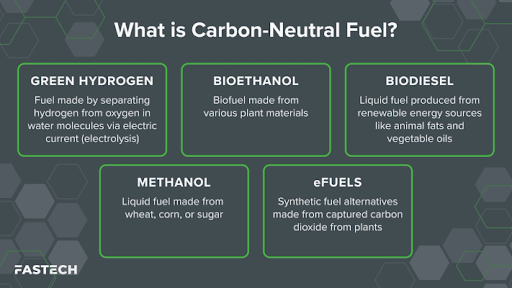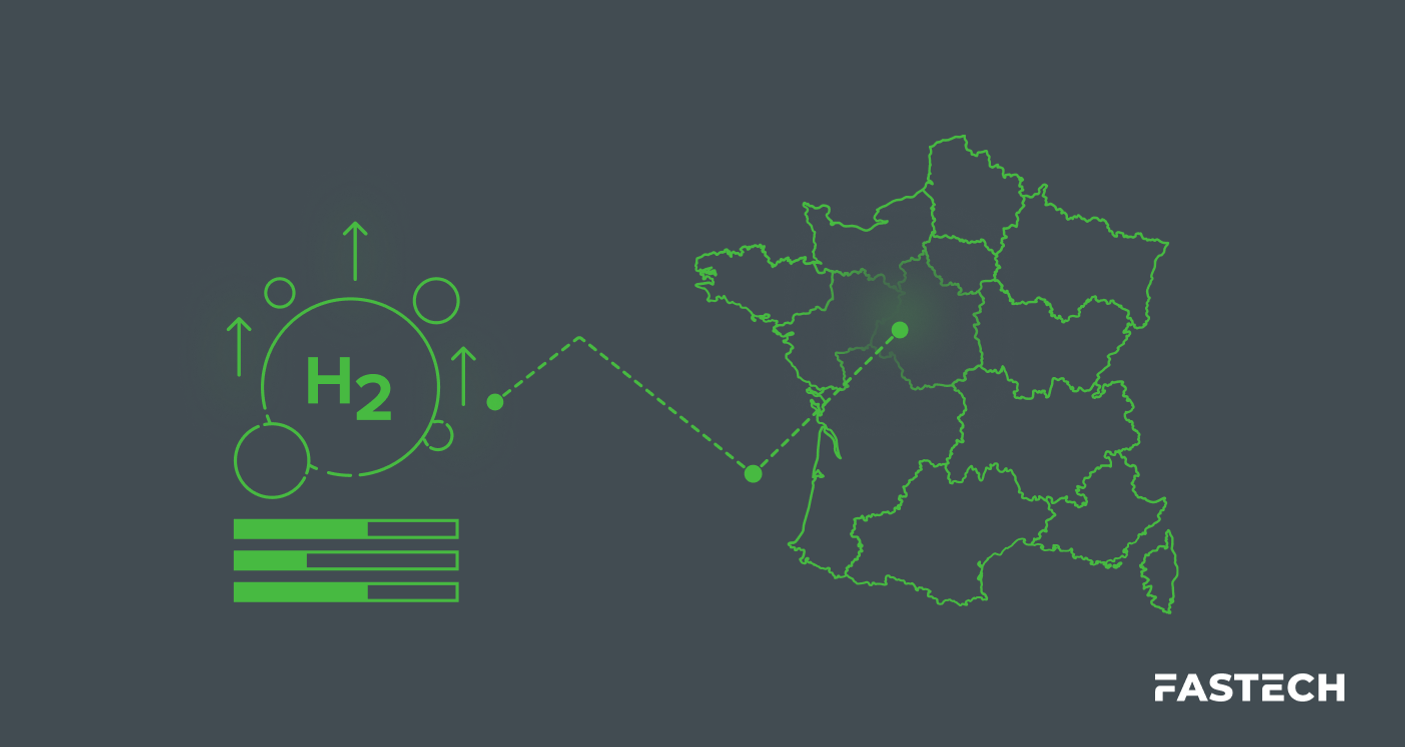What is Carbon-Neutral Fuel?

Carbon-neutral fuels have emerged as a promising solution to address climate change and the transition to cleaner energy sources, reducing the harmful effects of fossil fuels.
But what exactly is carbon-neutral fuel, and why is it garnering attention as a crucial element of our energy ecosystem? In this article, we take a closer look at carbon-neutral fuel and why it’s becoming a viable alternative to fossil fuels.
Carbon-Neutral Fuel 101
Carbon-neutral fuel is a type of fuel that does not contribute to net carbon dioxide emissions in the atmosphere when burned or used. These fuels use sustainable methods and technologies that minimize or offset carbon emissions throughout their lifecycle. Carbon-neutral fuels release the “right” kind of carbon (carbon dioxide) into the atmosphere when they burn.
As a result, the overall carbon impact remains neutral or close to neutral, hence the term "carbon-neutral" fuel. Carbon-neutral fuels do not have a carbon footprint nor create net greenhouse gas emissions. By adopting carbon-neutral fuels, we can reduce our reliance on fossil fuels, mitigate climate change, and work towards a more sustainable energy future.
Carbon-neutral fuels are considered alternative fuels that fall under the synthetic fuels umbrella. This category includes fuels made by chemically hydrogenating carbon dioxide, green hydrogen, and biofuels (see below).
What’s the Environmental Impact of Carbon-Neutral Fuels vs. Fossil Fuels?
The major distinction between carbon-neutral fuels and fossil fuels is their environmental impact. Fossil fuels (such as coal, oil, and natural gas) are formed from ancient organic matter and release substantial amounts of carbon dioxide when burned. These emissions contribute to the greenhouse effect, accelerating climate change.
Fossil fuels are finite resources that take millions of years to form, and their extraction and consumption contribute to the depletion of natural resources. In contrast, carbon-neutral fuels rely on renewable resources such as plant biomass, solar energy, wind power, or hydrogen, which are continually replenished by natural processes.

Examples of Carbon-Neutral Fuels
Here are a few different types of carbon-neutral fuels produced today:
- Green Hydrogen: Hydrogen produced through electrolysis, which uses an electrical current to separate hydrogen from oxygen in water molecules.
- Bioethanol: Biofuel made from various plant materials
- Biodiesel: Liquid fuel produced from renewable energy sources like animal fats and vegetable oils
- Methanol: Liquid fuel made from wheat, corn, or sugar
- eFuels: Electrofuel made from hydrogen and carbon dioxide
Benefits of Carbon-Neutral Fuel
Carbon-neutral fuels offer a range of significant benefits that contribute to a more sustainable and environmentally friendly future. Here are some key advantages.
Climate Change Mitigation
Using renewable resources and minimizing carbon emissions, carbon-neutral fuels help reduce greenhouse gas concentrations in the atmosphere. They help combat increasing global temperatures and their adverse effects on ecosystems, weather patterns, and human well-being.
Improved Air Quality
Carbon-neutral fuels, particularly those derived from biofuels, generally emit fewer pollutants during combustion than fossil fuels. This characteristic leads to improved air quality, as they release lower levels of particulate matter, sulfur dioxide, nitrogen oxides, and other harmful pollutants.
Emission reduction positively impacts public health, reducing respiratory ailments and other pollution-related health issues.
Technological Innovation and Job Creation
The shift towards carbon-neutral fuels drives technological advancements and fosters innovation in renewable energy technologies. This transition opens new avenues for research, development, and investment in clean energy solutions.
It also creates job opportunities in various sectors, including renewable energy production, infrastructure development, and related industries. These opportunities stimulate economic growth while addressing environmental challenges.
Energy Security and Independence
Carbon-neutral fuels enhance energy security by diversifying energy sources and reducing reliance on imported fossil fuels. By harnessing domestic renewable resources, countries can become more self-sufficient in meeting their energy needs, reducing the geopolitical tensions associated with importing fossil fuels.
Environmental Conservation
Carbon-neutral fuels contribute to conserving ecosystems and natural resources. They play a crucial role in preserving biodiversity and natural landscapes by minimizing environmental harm caused by fossil fuel extraction and combustion.
Carbon-Neutral Fuel Use Cases
Carbon-neutral fuels have diverse applications across various industries, making them versatile and sustainable solutions for powering transportation, energy production, and more.
Transportation
Carbon-neutral fuels are gaining traction as a cleaner and greener alternative to power various transportation modes. Electric vehicles (EVs) powered by renewable electricity or hydrogen fuel cells are becoming increasingly popular, significantly reducing greenhouse gas emissions compared to traditional internal combustion engines.
Energy Production
Carbon-neutral fuels play a vital role in sustainable energy production. They can be used in electricity generation, enabling a transition to cleaner and more environmentally friendly power sources. Biomass, biogas, and solar energy are renewable sources for carbon-neutral fuel-based energy production.
Industrial Processes
Carbon-neutral fuels can be utilized in industrial processes that require heat, such as manufacturing, refining, and chemical production. By replacing fossil fuels with renewable alternatives, industries can reduce carbon emissions and promote sustainability.
Agriculture
The agricultural sector can benefit from carbon-neutral fuels by adopting renewable energy sources for farming operations. This process includes utilizing biofuels from crops or agricultural waste to power machinery, irrigation systems, and farm vehicles.
Marine Applications
Carbon-neutral fuels have the potential to transform the shipping and maritime industry. By using biofuels or hydrogen, vessels can significantly reduce their emissions and contribute to cleaner oceans and coastal environments.
Heating/Cooling Systems
Residential, commercial, and institutional buildings can use carbon-neutral fuels in their heating and cooling systems. Renewable energy sources like geothermal or biomass-based fuels can offer efficient and environmentally friendly alternatives to traditional HVAC systems.
Industries and Companies Embracing Carbon-Neutral Fuels
Leading industries and companies embrace carbon-neutral fuels to pioneer sustainable practices and reduce their environmental impact. Adopting these fuels exemplifies a commitment to driving positive change and shaping a greener future for their respective sectors.
Aviation
United Airlines, JetBlue, and Lufthansa have initiated collaborations and invested in sustainable aviation fuel (SAF) to reduce their carbon footprint. SAF, a type of carbon-neutral fuel, has the potential to significantly lower greenhouse gas emissions in the aviation industry.
Automotive
Toyota, Hyundai and BMW have embraced carbon-neutral fuels by producing electric and hydrogen fuel cell passenger cars. Their commitment to sustainable mobility aims to reduce dependence on fossil fuels and contribute to a greener future.
Energy Providers
Companies like Google and Apple have prioritized renewable energy sources to power their operations. They have invested in large-scale solar and wind farms and carbon-neutral fuel-based energy solutions to ensure sustainable and eco-friendly power generation.
The Future of Carbon-Neutral Fuel
Carbon-neutral fuels present an exciting opportunity to transition towards a greener and more sustainable energy landscape. We can envision a future where carbon-neutral fuels are vital in mitigating climate change and fostering environmental stewardship. Embracing this sustainable energy solution is crucial for a brighter and cleaner future.
FASTECH: Your Partner in Alternative Energy Infrastructure EPCM
Once a niche segment, renewable energy is rapidly growing. FASTECH helps municipalities, industrial energy companies, and private and public organizations develop, construct, test and maintain renewable energy sites, including refueling stations and infrastructure.
If you’re looking for a partner with extensive experience in the Engineering, Procurement, Construction, and Maintenance (EPCM) of alternative and traditional fueling system infrastructure, you’ve come to the right place.
FASTECH has more than 25 years of industry experience building conventional fueling facilities. In addition, global industrial energy leaders have trusted FASTECH to provide alternative energy solutions and clean fuel consulting services.
To learn more about how you can get started with alternative energy, contact us today.




